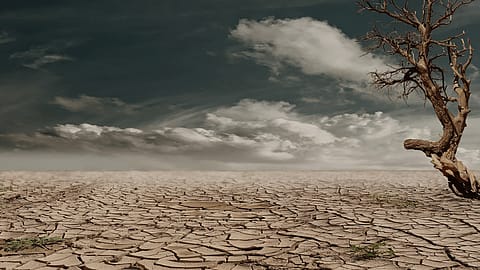Is climate change denialism seeping into India?
Errant voices irked by the impassioned rhetoric of Greta Thunberg have started to pipe up questioning climate change in India. But climate change has already hit the Indian economy badly.

No matter what anyone thinks about the positionality and passion of Greta Thunberg, the 16-year-old Swedish environmental activist, it cannot be denied that India, indeed the world faces a climate change disaster.
Naysayers in India who have started to fill social media and Whatsapp groups pointing to the good work of a few environmental champions at home, and angry at the ‘Leftist’ diatribe of Thunberg, are wasting their time. Instead they should listen to what the Indian Prime Minister Narendra Modi said at the United Nations Climate Change Summit in New York on September 23. Modi was, correctly, unambiguous about the threat, and that the world hasn’t done quite enough to mitigate it.
But astonishingly, in India, and specifically in those most raucous of Indian platforms of public debate, news television and social media, there is little clamour to understand the magnitude of the problem. In fact, in both those places, there is a strident rise of climate change denialism which—as I noticed recently open-jawed—compared climate change activism with radical Islam. Apart from asininity on environmentalism, this, if nothing else, is a damning report card on the state of primary education in the country.
It is therefore worth reiterating that the World Bank has predicted that by 2020—yes, that is in four months—pressure on India’s water, air, soil, and forests is expected to become the highest in the world. Also by 2020, India’s aggregate water demand is likely to outstrip supply, says the Bank, and past governmental policies have actually aggravated this situation instead of remedying it.
Therefore, the creation of an integrated water ministry by Modi is welcome, and it is unbelievable that the rancour in India from some of the loudest quarters would focus on the aggressive style of a Swedish teen rather than the clear and present danger that faces the country.
Earlier this year a study by Stanford scientists published in the National Academy of Sciences in America pointed out that climate change had already caused the Indian economy to be 31% less than what it would have been without such environmental degradation.
India is being impacted in every way by climate change—from extreme floods to terrible droughts. Even though many of its most persistent habits that impact climate change haven’t really altered, the country grows too much rice, cotton and sugarcane, in places which are often water-starved (all three are water-intensive crops).
Recommended Stories
There is no sign of a mass shift to public transport in the country, even though every major city seems to be building a metro railway system, whether they can afford it or not. No one, it seems, is focusing on getting thousands of new, good buses on the roads. Even when metro rail systems are built, no one thinks of last mile connectivity (hint: a solid bus network) and so, those who can afford it, still use their cars.
No Indian city has any real plan for mass-scale rainwater harvesting. So even the places that are sinking in floods at the moment are bound to run dry only a few months later. A majority of climate change in India comes from energy use and despite a major push from government towards renewable energy, especially solar, there has been little adoption of clean energy at the citizen level. The government was starting to make a vigorous effort to replace fossil-fuel using cars to electric vehicles, but the momentum has stalled as it is unclear if the necessary infrastructure including a rare earth pipeline for battery supply exists.
Modi’s climate commitments in Paris were lauded for their ambition and leadership, and he still sounds determined on the subject, but there is a worrying lack of appreciation of how grave the situation really is within the cacophonous Indian public sphere. It is time to name and shame climate change denialists in India.